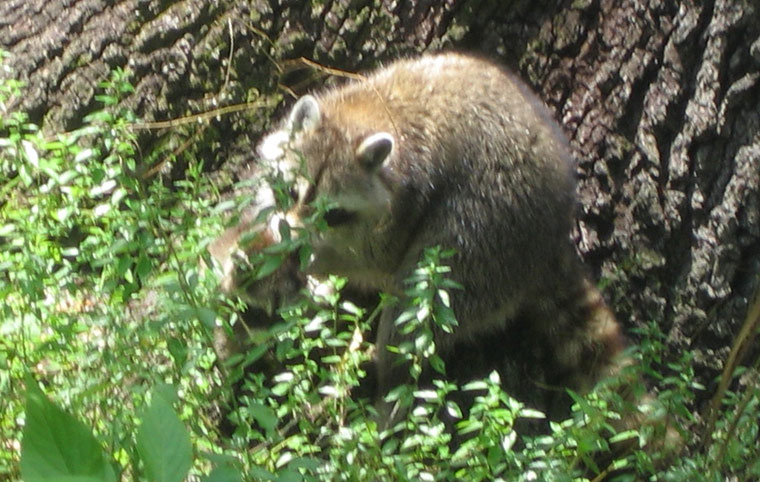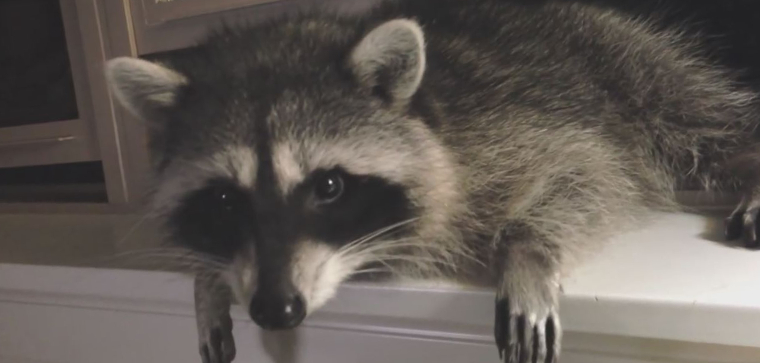-
info@aaanimalcontrol.com
Call us for help in your town
Humane Wildlife Education
Do raccoons attack cats, dogs, or other pets?
Need raccoon removal in your hometown? We service over 500 USA locations! Click here to hire us in your town and check prices - updated for year 2020.
Raccoons do attack cats, dogs, and other pets, and so do a wide variety of other wild animals. This is not generally an attacking thing, but more of a defensive thing. Raccoons and dogs / cats are generally well matched in the size and height variety, although raccoons can get to slightly larger than most household cats. When the two come up against each other, they will fit bitterly, not quite to the death, but until one of them backs down. It will usually be the one is the most injured. This COULD be your household pet.

Why do raccoons attack?
There are a wide range of reasons as to why a passing raccoon and a pet could come to blows. Raccoons are scavengers, and quite cheeky creatures at that. If you’ve seen them being adorable on social media, do not be fooled by their cute exteriors. If your pet is eating its food on the back porch or in the chicken coop, a raccoon could quite easily come along and dip its fingers in, helping itself. This will not make your pet happy at all, and is generally over food that confrontation happens. The fight could occur when a raccoon has started living on your property. When the raccoon does out, the pets get annoyed. They can’t exactly tell you what the problem is, can they?
As a general rule, the raccoon will attack if it feels it has no other way of defending itself, or it thinks it has something worth defending. It is usually the first one. And with 40 teeth in its mouth, the raccoon probably isn’t an animal you will want poor old Rex the dog or Tinkers the cat to come in contact with.
What happens if my pet is bitten by a raccoon?
If your pet is bitten or scratched by a raccoon, we would definitely recommend taking them to the vet to get them checked over. Pets often have a lot of fur, and if you have a particularly furry animal, you may find it can be quite difficult to actually see the bite. You might not have a good idea of how bad it really is, and you don’t want to ignore something that could potentially need sutures or antibiotics. Infections are a very definite cause of concern when you or your pets are bitten or scratched by a wild animal, such as a raccoon.
What about rabies?
Although the bite or scratch itself can be quite a bad injury, it won’t be the primary cause of concern following a wild animal attack. As well as general infections, rabies is a virus that you definitely won’t want to come in contact with. This infection affects the central nervous system of the cat, and is usually passed on from wild animal to pet in the form of a bite, or a scratch. The latter can occur when the animal has licked its claws. The infection is present in the saliva, and if the scratch penetrates the skin, the saliva, and therefore the virus within it, can travel to the bloodstream of your pet. At that stage, your pet will have become infected with rabies.
How long it takes for the virus to take affect will change from animal to animal, and will also change in individual cases among humans too. For some animals it can take just one day before symptoms start to take hold, but in other animals the infection can lay dormant for many weeks, months, and in some cases even years.
Other animals that can come into conflict with household pets and potentially transmit the rabies virus include bats, skunks, and foxes.
Quarantine is important if you believe that your cat or dog (or other household pet) has been infected with the rabies virus. Even if the wound itself doesn't look that bad, the bite can still be signifiant for disease. If your cat or dog has not been vaccinated against rabies, you should definitely get this done as a matter or urgency, particularly if they go outside.
Wild Raccoons — Will They Make a Great Pet?
Need raccoon removal in your hometown? We service over 500 USA locations! Click here to hire us in your town and check prices- updated for year 2020.
It seems to be quite fashionable these days for people to have pets that are a little 'out of the ordinary' — exotic, unique, a little bit weird. Once upon a time, people were quite content to have exotic animals such as turtles, snakes, spiders, perhaps the odd ferret or two, but fashion trends with pets change in much the same ways that all fashion trends do. Right now, bulldogs and pugs are all the rage in the dog world, but if you were to rewind a few decades, those two breeds wouldn't have been the fanciest pups on the block.

Although seemingly fashionable, having wild animals as pets isn't always the greatest idea. You may find one really great case of a friend-of-a-friend who once rescued a raccoon and now they all live happily ever after, but these tales are often urban myths or legends. Isn't it funny how it's always a “friend-of-a-friend” and none of these “friends” have real names? These happy-ever-after stories rarely ring true, and the ones that do are sheer fluke. Trying to keep a wild animal as a pet is never an easy process. Sometimes, even having a real pet as a pet isn't as easy as everyone makes it out to be.
Having a raccoon as a pet would be like having a terrible two year old, going through the terrible two's, forever. And we're talking FOREVER. They are the terrible-two's age for life; an animal who combines a love of food and cosy sleeping spots with curiosity not often seen in otherwise-cautious wild animals. Raccoons almost know how to use the cute-factor against us — being cute so that we give them food and record them, telling other humans of their cuteness so they will offer up food too.
Okay, we're making it sound a little bit like raccoons are taking over the world, but you can't deny that raccoon sightings in residential areas are on the increase. Taking over the world they might not be, but they sure as heck are taking over your neighborhood.
Raccoons will not make a great pet, because they're not a pet. They're a wild species. We've barely scratched the surface of domesticating them. It took close to two millennia for us to successfully learn how to domesticate the other animals we now have in our homes. Did you really think we could manage it with raccoons in just a few short years?
Raccoons don't respond well to being cooped up. They won't like a collar. They won't like it if you try to put them in a cage. They won't like it if they can't get out of the door when they want to go. They'll just tear through stuff. Break it. Smash it. It doesn't matter. They do what they need to do in order to get to where they want to go. They have no qualms about breaking into your home, usually up in the attic, so what makes you think they'll be worried about breaking out? They won't be.
Even those people who love raccoons — volunteers and wildlife rehabilitators that have grown to have a certain kind of fondness of raccoons — will tell you that raccoons are an almighty pain in the butt.
Stubborn. Determined. Intelligent. Hilarious. Crafty. Cunning. Manipulative.
These are all words that have been used by experts to describe raccoons. The kind of words you would look for in a pet should be loyal, faithful, adoring, eager to please, etc. Raccoons don't have those traits. They are starting to pick them up a little, perhaps, but they aren't there yet. In a few more centuries, perhaps having a raccoon in your home is going to be just as normal as having a cat or a dog, but right now, raccoons are not domesticated enough to be kept as pets, not do they want to be.
For more information, you may want to click on one of these guides that I wrote:
How much does raccoon removal cost? - get the lowdown on prices.
How to get rid of raccoons - my main raccoon removal info guide.
Example raccoon trapping photographs - get do-it-yourself ideas.
Raccoon job blog - learn from great examples of raccoon jobs I've done.
raccoons in the attic


















